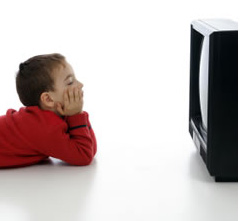
The more television they watch the more problems they could face, the study of more than 1,000 children born in Dunedin, New Zealand between April 1972 and March 1973 found.
The studied children aged five to 11 watched an average of 2.05 hours of weekday television. From age 13 to 15, the time spent in front of the television rose to an average of 3.1 hours a day.
The new study has found that children who watched more than two hours and particularly those who watched more than three hours of television per day during childhood had above-average symptoms of attention problems in adolescence.
Symptoms of attention problems included short attention span, poor concentration and being easily distracted.
Young children who watched a lot of television were more likely to continue the habit as they got older but even if they did not the damage was done.
“This suggests that the effects of childhood viewing on attention may be long lasting,” study author Erik Landhuis, from New Zealand’s University of Otago, wrote in his report.
However, In the report published Tuesday in the journal Paediatrics, the researchers added that their study is not proof that television viewing causes attention problems because it may be that children prone to attention problems may be drawn to watching television.
It is also possible that such viewing may supplant other activities that promote concentration, such as reading, games, sports and play, Landhuis said.
